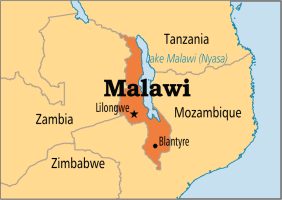The United Nations Economic Commission for Africa (ECA) launches Malawi Country Profile this week in Lilongwe, Malawi by SRO-SA in partnership with the National Statistics Office of Malawi.
The Country profiles provide evidence based information and analyses on socio-economic trends and tracks progress in areas of regional integration, gender equality and social development in member-states.
The launch attracted high level participation including the Secretary to the Treasury, Commissioner for Statistics in Malawi, the Deputy Commissioner, senior officials of government from the ministries, members of the academy and the media.
The launch was done by Mr. Ben Botolo, the Chair of SRO-SA ICE Bureau and the Secretary to the Treasury. The Commissioner for Statistics, Ms. Mercy Kanyuka, in her welcome address thanked ECA for organizing the launch and noted that it is really remarkable that the data used in the CP was from the NSO and that there was regular consultation and visit to their office in the process of preparing the CP.
She implored that there should be deeper collaboration between the NSO and ECA and the launch should provide a major starting point in doing so.
Twenty-one country profiles were released in 2016, covering Angola, Malawi, Mauritius, Mozambique, South Africa and Swaziland in the Southern Africa region. Others are Central African Republic, Equatorial Guinea [Spanish], Gabon and Chad for Central Africa.
The ones done for the East Africa sub region are Burundi, Djibouti, Madagascar and Somalia. For North Africa: Algeria [Arabic], Mauritania [Arabic] and Tunisia [Arabic] were done, while Cabo Verde, The Gambia, Ghana and Nigeria were released for the West Africa sub region. T
The Director of SRO-SA, Mr. Said Adejumobi in his introductory remarks underscored the three unique features of the ECA country profile, namely the use and showcasing of data from the NSOs, the tracking of three developmental trends in Africa- regional integration, gender equality and social development through the indexes developed by ECA and finally is the focus on a specific theme of economic transformation in the thematic section of the report, which in the case of the Malawi CP is on agricultural transformation.
He noted that rain-feed agriculture can no longer be the way of doing business, rather, modern forms of agricultural practices should to be explored accompanied by concerted efforts on building an agro-allied industrial base.
Reacting to the presentation of the report, which was done by its author-Anthony Taylor, the two discussants of the report, Mr. Adwell Zembele, Acting Director, Finance and Economic Planning, Ministry of Finance and Dr. Jesman Chintsanga, Demography Lecturer at the University of Malawi, praised ECA for the work on the CP.
According to Mr. Zembele, “we agree with the report and we agree with the recommendations of the report and we hope to follow-up on the key recommendations aimed at improving the performance of the economy”. Dr. Chitsanga on his part noted, “it is a welcome report. The indexes are very good and very useful in monitoring progress in several areas of socio-economic development”.
The participants generally expressed satisfaction with the report, and in the question and answer session asked about the periodicity of the report, how ECA intends to support the work of the NSOs beyond the production of country profiles and ECA’s efforts at supporting economic transformation in the country and the region. All these were responded to by the ECA team present at the launch.

